Mike Schur Knows 'Parks and Rec' Would Have Seemed 'Naive' Post-Trump
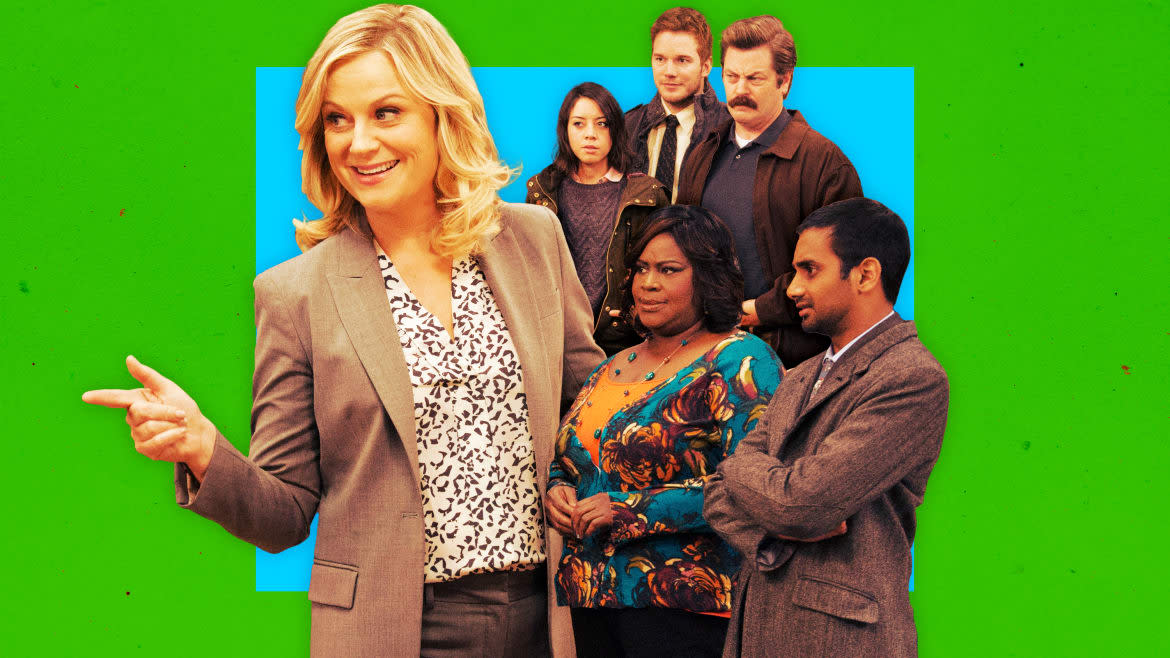
- Oops!Something went wrong.Please try again later.
- Oops!Something went wrong.Please try again later.
- Oops!Something went wrong.Please try again later.
- Oops!Something went wrong.Please try again later.
When Parks and Recreation first premiered in spring 2009, we were all living in a different world. Wide belts, baker boy hats, and multi-colored tights were all the rage. Everyone was worried about swine flu. And a charismatic politician named Barack Obama had just been inaugurated as our first Black president. For many, it was a time of hope. It’s no wonder Amy Poehler’s unforgettable public servant Leslie Knope and her many, many eccentric neighbors and colleagues stole our hearts.
Parks and Rec might’ve faced a shaky reception during its first season on NBC, but it didn’t take long before the long-running sitcom became inescapable. Most of its core cast have become famous in their own right—Adam Scott, Aubrey Plaza, Chris Pratt, Nick Offerman, Aziz Ansari, Rashida Jones, and even smaller players like Ben Schwartz and Jenny Slate. Part of that success might have to do with the show’s organizing mantra, known internally as “The Poehler Rule.” The directive, said co-creator Mike Schur, was always to hire the funniest possible person for any given role—whether it was a bit part or a season-long arc.
“It seems so obvious, but a lot of shows don't always do that,” Schur told The Daily Beast’s Obsessed during a recent conversation about the show’s legacy and longevity. “They have some other criterion that they think is more important. It turns out, there's nothing more important for comedy than just being funny.”
For many, Parks and Rec was delightful comfort food, a sunny portrait of public service that emphasized the power of teamwork over the individual. In a post-2016 world, however, some aspects of the series and its ethos—or, at least, its relationship with government—might feel a little dated. At the same time, as Schur notes, “the bigger, more important themes of the show weren't really about government or politics.” It was about collaboration, friendship, and the value each person and their weird journey can bring to the table.
To honor the show’s 15th anniversary this past April, we caught up with Schur to discuss the show’s funniest behind-the-scenes moments, its approach to politics, and the footprint it’s left behind.
Adam Scott on Why the ‘Parks & Rec’ Cast Never Got Too Political—Until Now
What did Parks and Recreation mean to you when it first started, and did that mission remain the same throughout the time you made it?
Wow, starting with the easy one!
It was the first show I ever ran. Greg Daniels and I ran it together for the first year or so, and then I ran it alone for the rest of the time. I was very nervous at the beginning, because Amy was coming off of one of the greatest runs that anyone's ever had at SNL and was universally beloved and adored. When the show was not critically well received in our first season, I had terrible insomnia. I would lie awake in my bed and think, “I’m going to be the asshole who ruins Amy Poehler’s career.” Then things turned around and that thought left my head, which was nice.
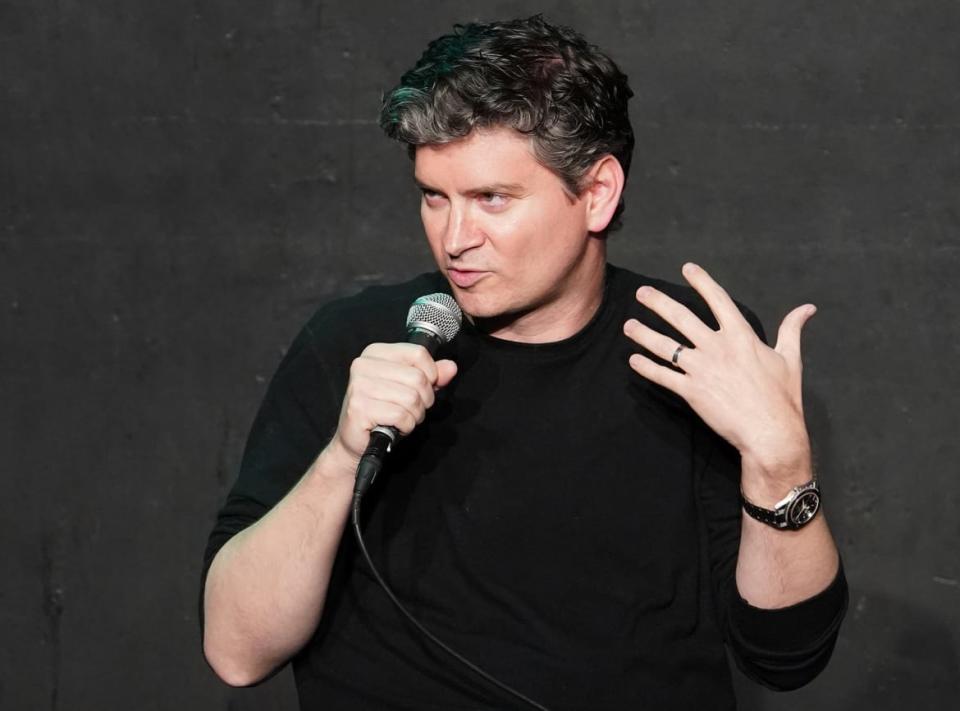
Parks and Recreation co-creator Michael Schur.
I can imagine that was a relief!
Greg and I developed the show in the run-up to Obama being elected, and we had this idea in our heads of creating a character that had an Obama-like approach to government. He was an incrementalist. He had this really dogged belief that slow and steady wins the race. One of the great things about TV—at least the way it used to function—was that if a show was successful, that gave you the chance to tell a story very slowly over the course of many, many, many episodes.
So that was our idea: to tell the story of an incrementalist going from one kind of person to another kind of person in her professional life and personal life, and taking this relentless enthusiasm and optimism about the power of government to be transformative and to change people's lives for the better, and telling it in a really slow and deliberate way. We kept that as the North Star for the show throughout the entire run of the series.
Has Amy ever talked to you about what it’s like to be known as Leslie Knope—and to, I imagine, be seen as her by viewers?
Amy is so good at pretty much everything that I don't think she was really ever in danger of being one of those actors who is only identified as one thing. She's a director and a writer, and she hosted the Golden Globes a million times with Tina [Fey]. She doesn't like to sit still. Even though she was the title character in a long-running sitcom, I'm guessing she never worried about that. … She just is too varied as a human being and as an artist.
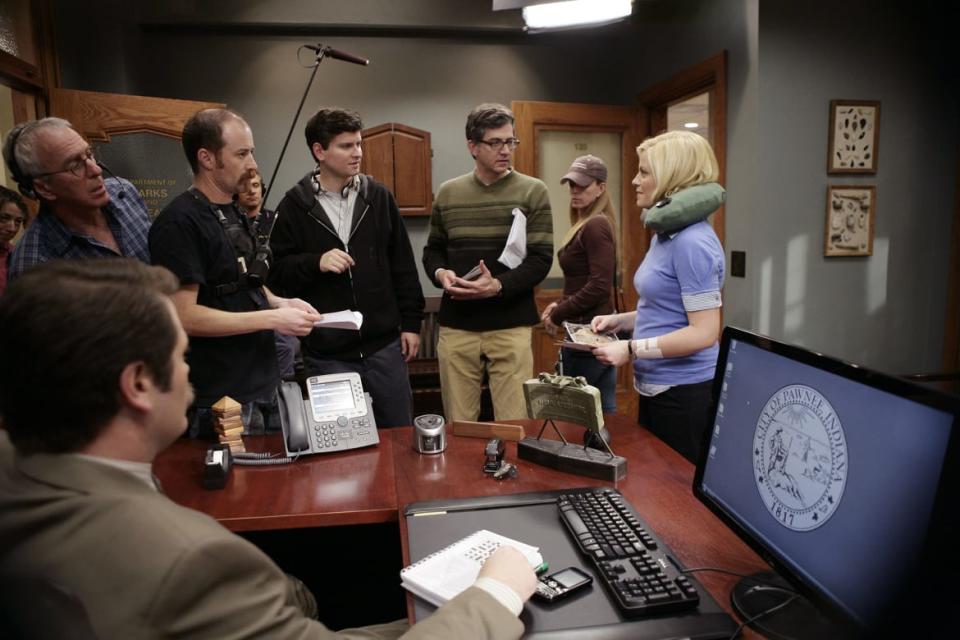
Nick Offerman as Ron Swanson, co-creator Mike Schur, co-creator Greg Daniels and Amy Poehler as Leslie Knope on April 9, 2009.
What conversations have you had with her about the character and her legacy, in the 15 years since the series premiered?
We’ve had conversations occasionally about the show and about how it was a real time-and-place kind of deal. It debuted right after Obama was elected, and it basically ran the length of his two terms. I don't think it would have been the same kind of show if it had come before or after that specific era.
Even in that era, I think we were fighting a little bit of, like, “Is [Leslie] a wallflower, or is she too naive to function properly, and is this show a wish-fulfillment kind of a deal?” But we always tried, and I think succeeded—although I guess I shouldn't be the judge of that—in showing that for a person with her set of beliefs, it's not easy. [Leslie] got beaten up a lot. She ran into a lot of obstacles and had a lot of setbacks because that's just the reality. Anyone who's trying to do something is going to be met with opposition. The only people who aren't met with opposition are the people who aren’t trying to accomplish anything.
I'm very grateful that we got the chance to do that show in that moment, because I think that's the only moment this show was really possible. If it had been 2016 and Trump had just been elected and we had tried to do the same show, it would have seemed insane.
‘Bridgerton’ Season 3 Is More Enchanting and Sexier Than Ever
If you were writing the show now, having seen the results of the 2016 election, would you perhaps write it differently? Based on your previous answer, maybe it’s just not possible to write a show like this now at all.
It’s hard to say, really, what we would have done differently or how the show would have looked if it had been in a post-Trump era. The basic plot couldn't have been the same, because it would have seemed hopelessly naive to say, “Hey, if we just bear down and grit our teeth, we can make things happen.” Like, that was not true starting in 2016.
But, you know, the themes of the show—the ways in which a person in politics who actually cared about making the world better was met with resistance from people who did not care at all about making the world better—that stuff was true before Trump, and it'll be true after Trump is gone.
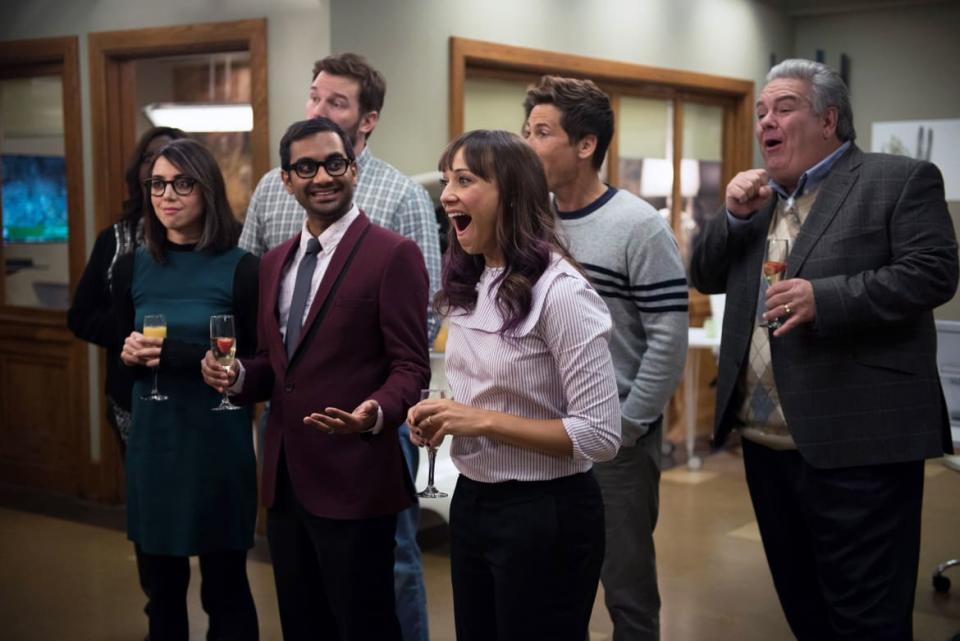
(l-r) Aubrey Plaza, Aziz Ansari, Chris Pratt, Rashida Jones, Rob Lowe, and Jim O'Heir.
To your point about Parks and Rec being tied to such a moment in our politics, I have seen people make the argument that because this show feels inextricably tied to that Obama era liberalism, it can feel dated.
Has watching this circus that's unfolded in all branches of government in the last 15 years altered your relationship with that ethos at all?
I think that the show was doing a couple of different things, or at least trying to do a couple different things. One of them was to comment on the world of government and politics at that exact moment in time—from 2008 to 2014. As soon as you are doing any show that has to do with a specific era, you’re putting a little bit of an expiration date on its relevance.
But to us, the bigger, more important themes of the show weren't really about government or politics. It was about the idea that you're better as part of a team than as an individual. It was about a female friendship where two women met each other accidentally and then helped each other in different ways in their lives—stuff that isn’t of a time and place but hopefully more timeless or universal.
I think any show that lasts for seven years has to be talking about a bunch of different stuff. I would hope that there are at least some aspects of the show that still feel relevant or still feel interesting or fun to watch.
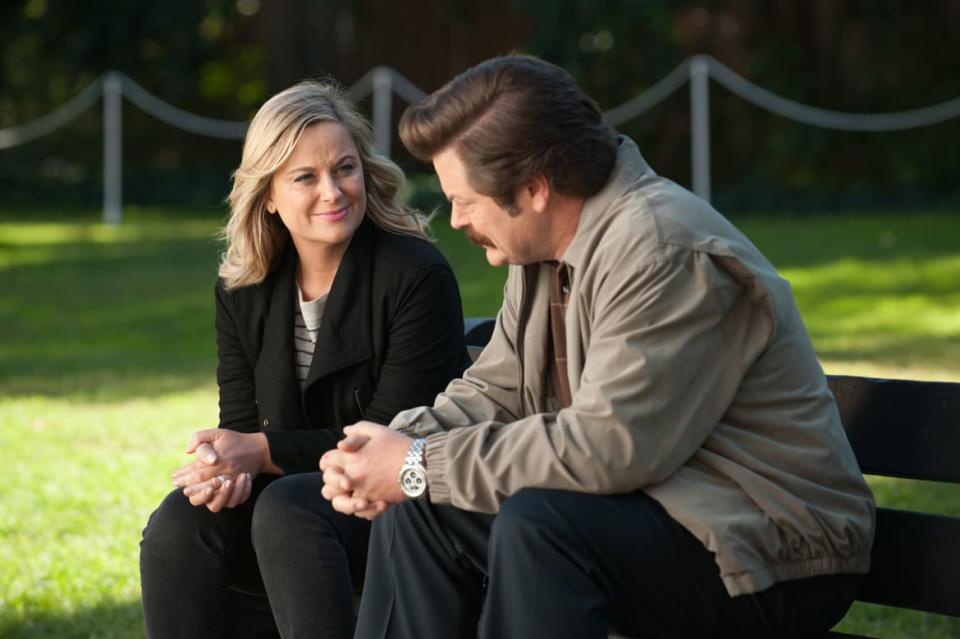
Amy Poehler and Nick Offerman.
Absolutely. And there are just so many funny scenes that I think fans still remember and that still come up as memes. My editor and I were just talking about Leslie Knope and her team having to stumble across the ice skating rink to Gloria Estefan’s “Get on Your Feet.” Is there a scene that still stands out to you as the funniest to make?
That [scene] popped into my head sort of fully formed as an idea when we had that idea for her announcing the campaign launch. We had an incredibly good writing staff that filled it out with 1,000 jokes and little moments and built it into a sort of wonderful climax. That's a big one.
When I think about the show, I often think about the town meetings. The goal of the show on some level was to create an entire city, an entire community, whole-cloth, and to have people who, like in The Simpsons, could pop in and out of different episodes. And when they showed up, you were like, “Oh, I remember that guy,” or, “Oh, yeah, that lady, she's funny.”
I've heard from a decent number of folks who actually work in government, and the number one thing they usually say is, “Man, are those accurate.” When the public weighs in on any issue, that’s what it’s like. For better and worse in a democracy, people love weighing on stuff. So those scenes where just a bunch of inexplicably angry people show up and raise their hands and stand up and speak—I think that's a pretty good legacy for the show, if we got that right.
What are you most proud of when you look back on Parks and Rec?
Amy invented this thing that we later called “The Poehler Rule.” Whether it was one line or a season-long arc, it was always, “Let's just hire the funniest person.” That rule is what got us Kathryn Hahn, and Mo Collins, and Ben Schwartz, and Jenny Slate, and Paul Rudd. Jason Mantzoukas. It seems so obvious, but a lot of shows don't always do that. They have some other criterion that they think is more important. It turns out, there's nothing more important for comedy than just being funny.
I remember at the time, I think it was maybe Season 2 or 3, we were watching these videos of this very strange man doing man-on-the-street interviews at various events. It was Kyle Mooney, who later went on SNL. He was doing this really weird character—an incredibly awkward, sort of shy, lilting weirdo who was interviewing people on the street, and I was just like, “Who is that guy? We gotta get that guy in the show.” We literally just wrote a little part for him in an episode where Ron was looking for a new assistant. And then a year after that, he was on SNL, and it was like, “Yeah, we were right. That guy's funny. He's a weirdo.”
I was always proud of that, among other things. I'm proud of the fact that the show created this weird space for funny people to just come and goof around.
Get the Daily Beast's biggest scoops and scandals delivered right to your inbox. Sign up now.
Stay informed and gain unlimited access to the Daily Beast's unmatched reporting. Subscribe now.

